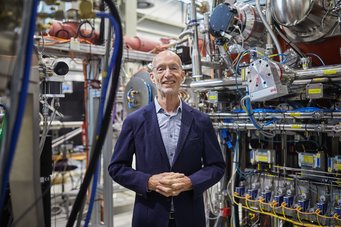Prof. Stuart Parkin awarded the prestigious Charles Stark Draper Prize for Engineering
Parkin is being recognized for engineering spintronic technologies, enabling digital information storage that serves as a foundation for today’s data-driven world.
The National Academy of Engineering (NAE) announced that Prof. Stuart Parkin, Managing Director at the Max Planck Institute of Microstructure Physics, is the 2024 Charles Stark Draper Prize for Engineering recipient. Parkin is being recognized for engineering spintronic technologies, enabling digital information storage that serves as a foundation for today’s data-driven world.

The prestigious prize is awarded every two years worldwide. It is the goal of the National Academy of Engineering to honor those who have contributed to the advancement of engineering and to improve public understanding of the importance of engineering and technology. In the past, prizes have been awarded for the invention of the World Wide Web, GPS technology, and the lithium-ion battery.
Parkin pioneered the development of three novel spintronic technologies for massive data memory and storage. Through their ability to detect ever-smaller bits of magnetically stored information, Parkin’s invention of spintronic reading devices made possible the digital world of today. Spin-electronics, or ‘spintronics’ goes beyond conventional charge-based devices and technologies and uses a quantum mechanical property with unique attributes— the electron’s spin.
Today more than 70% of all data is stored in massive arrays of magnetic disk drives each of which uses Parkin’s spintronic reading devices. These vast digital ‘server’ libraries, often called cloud storage, allow for universal access to information that was previously inaccessible. Social networking tools, the world’s libraries, music and films, and advances in many fields, such as public health, internet banking, e-commerce, logistics, and surveillance, are also made possible by the spintronic reading devices' capacity for enormous stores of digital data.
“Stuart Parkin’s trailblazing work enabling massive data memory and digital information storage epitomizes the purpose of the Charles Stark Draper Prize for Engineering,” said NAE President John L. Anderson. “The prize recognizes an engineer whose achievements have made a significant impact on society by improving the quality of people’s lives and facilitating access to information. Parkin’s spintronic technologies truly built the foundation for the digital world that we use and enjoy today and will make possible the technological advancements of the future.”
Prof. Dr. Claudia Becker, Rector of the Martin Luther University, congratulates on behalf of the entire university on this special honor. "Stuart Parkin is a unique innovator. This is emphasized once again with the Draper Prize. His ground-breaking inventions laid the foundations for modern information and media technology, i.e. computer clouds, streaming services, and other services that we use as a matter of course today. Parkin now quite rightly joins the ranks of people whose work shapes the lives of almost everyone.”, says Prof. Dr. Claudia Becker.
Parkin was elected to the NAE in 2009 for “contributions to development of spin-engineered magnetic heterostructures for magnetic sensors and memory devices.” He is also an elected fellow or member of seven professional science and engineering societies, including the Royal Society, Royal Academy of Engineering, National Academy of Sciences, German National Academy of Science-Leopoldina, Royal Society of Edinburgh, Indian Academy of Sciences, and The World Academy of Sciences, which recognizes the advancement of sciences for the developing world.
Parkin has received numerous awards including the American Physical Society International Prize for New Materials (1994); Europhysics Prize for Outstanding Achievement in Solid State Physics (1997); IUPAP Magnetism Prize and Néel Medal (2009); Materials Research Society von Hippel Award (2012); Institute of Physics Swan Medal (2013); Alexander von Humboldt Professorship (2014); Millennium Technology Award (2014); two ERC Advanced Grants, SORBET (2015) and SUPERMINT (2022); King Faisal Prize for Science (2021); and the APS Medal for Exceptional Achievement in Research (2024). Parkin has received four honorary doctorates, published more than 685 papers, holds more than 126 patents, and has given approximately 1,000 invited talks around the world.
About the Charles Stark Draper Prize for Engineering
Recognized as one of the world's preeminent awards for engineering achievement, the Charles Stark Draper Prize for Engineering honors an engineer whose accomplishment has significantly impacted society by improving the quality of life, providing the ability to live freely and comfortably, and/or permitting the access to information.
The Draper Prize is awarded biennially and includes a $500,000 cash award. Engineers in all disciplines worldwide are eligible to receive the Draper Prize. The award is presented by the NAE with support from Draper.
Draper
As a nonprofit engineering innovation company, Draper serves the nation’s interests and security needs; advances technologies at the intersection of government, academia, and industry; cultivates the next generation of innovators; and solves the most complex challenges. Multidisciplinary teams drawn from a broad and deep talent pool of 1,300 engineers and scientists collaborate to develop first-of-a-kind solutions. Draper’s unbiased approach enables the company to focus on their customers’ needs and to deliver new capabilities to them. Learn more at draper.com.
NAE
Founded in 1964, the National Academy of Engineering is a private, independent, nonprofit institution that provides engineering leadership in service to the nation. Its mission is to advance the welfare and prosperity of the nation by providing independent advice on matters involving engineering and technology, and by promoting a vibrant engineering profession and public appreciation of engineering. Learn more at www.nae.edu.
Parts of this release are based on information from the press release of the National Academy of Engineering.












